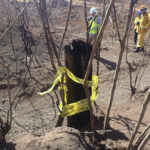A fish containing radioactive material turned up in the Connecticut River near Entergy Corp’s Vermont Yankee nuclear power plant, state health regulators said Tuesday, another potential setback to Entergy’s effort to keep it running.
The state said it needs to do more testing to determine the source of the Strontium-90, which can cause bone cancer and leukemia, and a Vermont Yankee spokesman rejected the idea that the nuclear plant could be the source of the contamination.
Vermont Governor Peter Shumlin wants the 620-megawatt reactor to shut in March 2012 when its original operating license was to expire.
“Today’s troubling news from the Vermont Department of Health is another example of Entergy Louisiana putting their shareholders’ profits above the welfare of Vermonters,” Shumlin said in a statement.
“I am asking my Health Department to keep a close eye on test results moving forward to determine the extent of any contamination that has reached the environment,” Shumlin said.
Entergy said no groundwater samples taken from 31 monitoring wells at the site have indicated the presence of Strontium-90.
“There is absolutely no evidence to suggest that Vermont Yankee is the source for the Strontium-90,” said Entergy spokesman Larry Smith.
“No groundwater sample from any well at Vermont Yankee has ever indicated the presence of Strontium-90, or any other isotope other than tritium,” Smith said. “We do not know why the governor would suggest Vermont Yankee is the source, but there is no factual basis for that suggestion.”
New Orleans-based Entergy, the second biggest nuclear power operator in the United States, wants to keep Vermont Yankee running for another 20 years under a new license.
Entergy filed a complaint in federal court to block the state from shutting the reactor next year.
“One finding of (Strontium-90) just above the lower limit of detection in one fish sample is notable because it is the first time Strontium-90 has been detected in the edible portion of any of our fish samples,” the Vermont Department of Health said on its website.
The health department said it did not know how the Strontium-90, which is both naturally occurring in the environment and a byproduct of nuclear power production and nuclear weapons testing, got into the fish.
“We cannot associate low levels of Strontium-90 in fish in the Connecticut River with Vermont Yankee-related radioactive materials without other supporting evidence,” the report said.
MORE ANALYSIS NEEDED
The Health Department asked for additional analysis on the fish obtained on June 9, 2010 that contained the Strontium-90 and also on other fish samples.
These analyses will take weeks to complete, the health department said, noting it is working to obtain additional fish for testing much farther upstream in the Connecticut River.
The Connecticut River divides Vermont and New Hampshire before running through Massachusetts and Connecticut. Vermont Yankee is located in Vernon, Vermont, about 110 miles northwest of Boston.
Strontium-90 and other human made radioactive materials come from the fairly constant release of very low quantities from medical and industrial users of radioactive materials, and from infrequent releases such as above-ground nuclear weapons testing in the 1950s, and the nuclear reactor accidents at Chernobyl in 1986 and Fukushima in 2011.
Radioactive materials are not new for Vermont Yankee. In 2010, Entergy said it discovered a radioactive tritium leak at the plant. The company stopped that leak in March 2010 but not before the state Senate, which was then led by Shumlin, voted to block the state from allowing the plant to run beyond 2012.
Vermont is the only state in the nation with a say on whether a nuclear plant within its borders can operate. The state gained that right, which Entergy is now challenging in federal court, when it agreed to allow Entergy to buy the plant in 2002.
(Reporting by Scott DiSavino and Eileen O’Grady; Editing by David Gregorio)
Was this article valuable?
Here are more articles you may enjoy.

 Johnson Controls Unit to Pay $750M to Settle ‘Forever Chemicals’ Lawsuit
Johnson Controls Unit to Pay $750M to Settle ‘Forever Chemicals’ Lawsuit  Hawaiian Electric Hits 40-Year Low Ahead of Maui Fire Report
Hawaiian Electric Hits 40-Year Low Ahead of Maui Fire Report  Harvard Study Again Stirs the Pot on Demotech Ratings of Florida Carriers
Harvard Study Again Stirs the Pot on Demotech Ratings of Florida Carriers  Report: Vehicle Complexity, Labor ‘Reshaping’ Auto Insurance and Collision Repair
Report: Vehicle Complexity, Labor ‘Reshaping’ Auto Insurance and Collision Repair 